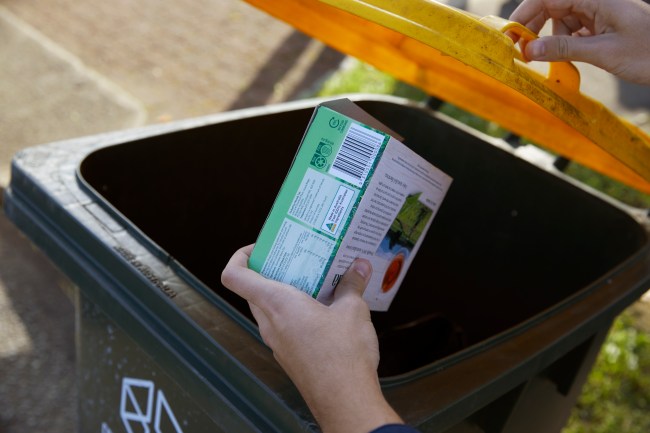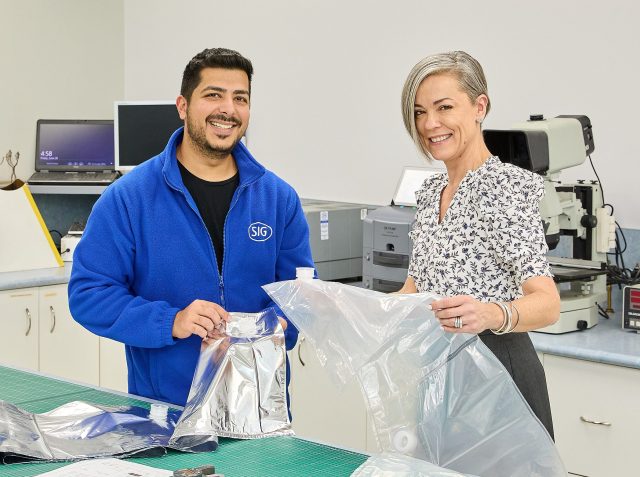
As National Recycling Week celebrations kick off around the nation, a new online packaging platform has launched empowering small businesses to help their customers recycle right.
The ARL Marketplace aims to help small-to-medium businesses (SMEs) get the support they need to navigate packaging sustainability and recycling, by providing access to Australia’s only evidence-based recycling label, the Australasian Recycling Label (ARL).
The label gives consumers the confidence to recycle all parts of a product’s packaging responsibly. It’s also been proven to make Aussies better recyclers – when the ARL is used on-pack, consumers are more likely to dispose of packaging in the right bin, helping to lift recycling rates (2023 ARL Consumer Insights Report).
In 2022, the program was granted $4.5 million in funding from the Commonwealth government, to support SMEs to improve the sustainability of their packaging.
The ARL Marketplace enables SMEs to source packaging from registered suppliers like Pact Group, Zipform Packaging and Labelmakers Group that is ready-to-label with the ARL.
“We understand that with so many competing responsibilities it can be difficult for small businesses to prioritise sustainability,” said APCO CEO, Chris Foley.
“APCO is working to strengthen the recycling system and support SMEs through the imminent packaging regulations that will come into place – and one of those ways is through the ARL Marketplace.
“The ARL Marketplace offers Australia’s small businesses an easy way to take action on packaging sustainability and reap the rewards. Small businesses have a major role to play in improving packaging sustainability in Australia – there are 2.5 million of them that make up more than 97 per cent of Australian businesses. By connecting them directly with packaging suppliers, we are making it easier than ever for small businesses to get the ARL on-pack.
“The ARL is a valuable tool for businesses to understand the environmental outcomes of the materials they are using in their packaging and plays a vital role in helping consumers recycle better. The Marketplace Directory is an important step forward in supporting industry to achieve packaging circularity here in Australia,” Foley added.
The launch of the ARL Marketplace is the culmination of a two-year education campaign led by the Australian Packaging Covenant Organisation (APCO), the Australian Institute of Packaging (AIP), the National Retail Association (NRA) and the Australian Food and Grocery Council (AFGC). These leading industry bodies have supported the delivery of the campaign by engaging thousands of small businesses through information sessions, events and training to increase their understanding of the ARL.
Nerida Kelton, executive director, AIP said: “One of the biggest challenges faced by SMEs in our region is access to training and education so that they have the same equal platform to create fit-for-purpose and functional sustainable packaging that has the lowest environmental impacts. The ARL Marketplace provides SMEs with numerous learning modules created by the AIP that ensure that everyone can embed the Sustainable Packaging Design principles and the ARL on all of their packaging.”
Bonnie Marshall, policy officer, NRA, said: “The National Retail Association has engaged with thousands of businesses to encourage uptake of the ARL. Applying the ARL on pack will help businesses understand their packaging and what their consumers are looking for. We know there is an increase in consumers looking for more sustainable packaging and the ARL is an easy-to-understand labelling system that removes the confusion around where a product should be placed in the recycling and waste stream.
“Additionally, the ARL provides businesses and suppliers the opportunity to undertake an assessment of their packaging, to understand their impact on packaging sustainability and, to source ARL approved packaging, through the ARL Marketplace website.”
Barry Cosier, director of sustainability, AFGC said: “The Australian Food and Grocery Council is supportive of all actions that lower the barriers to recycling for businesses and simplifies recycling for consumers. This initiative helps small, busy manufacturers navigate a complex recycling environment and empowers them to make sustainable packaging design choices effortlessly, enriching both their operations and our environment.”
Comment below to have your say on this story.
If you have a news story or tip-off, get in touch at editorial@propack.pro
Sign up to the ProPack newsletter


